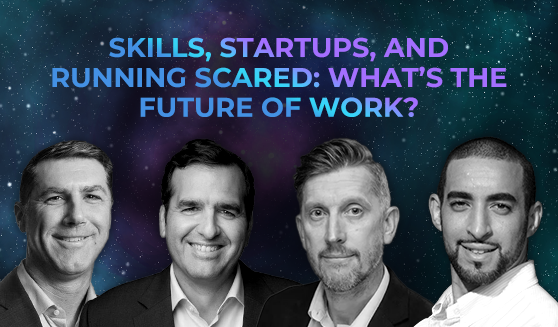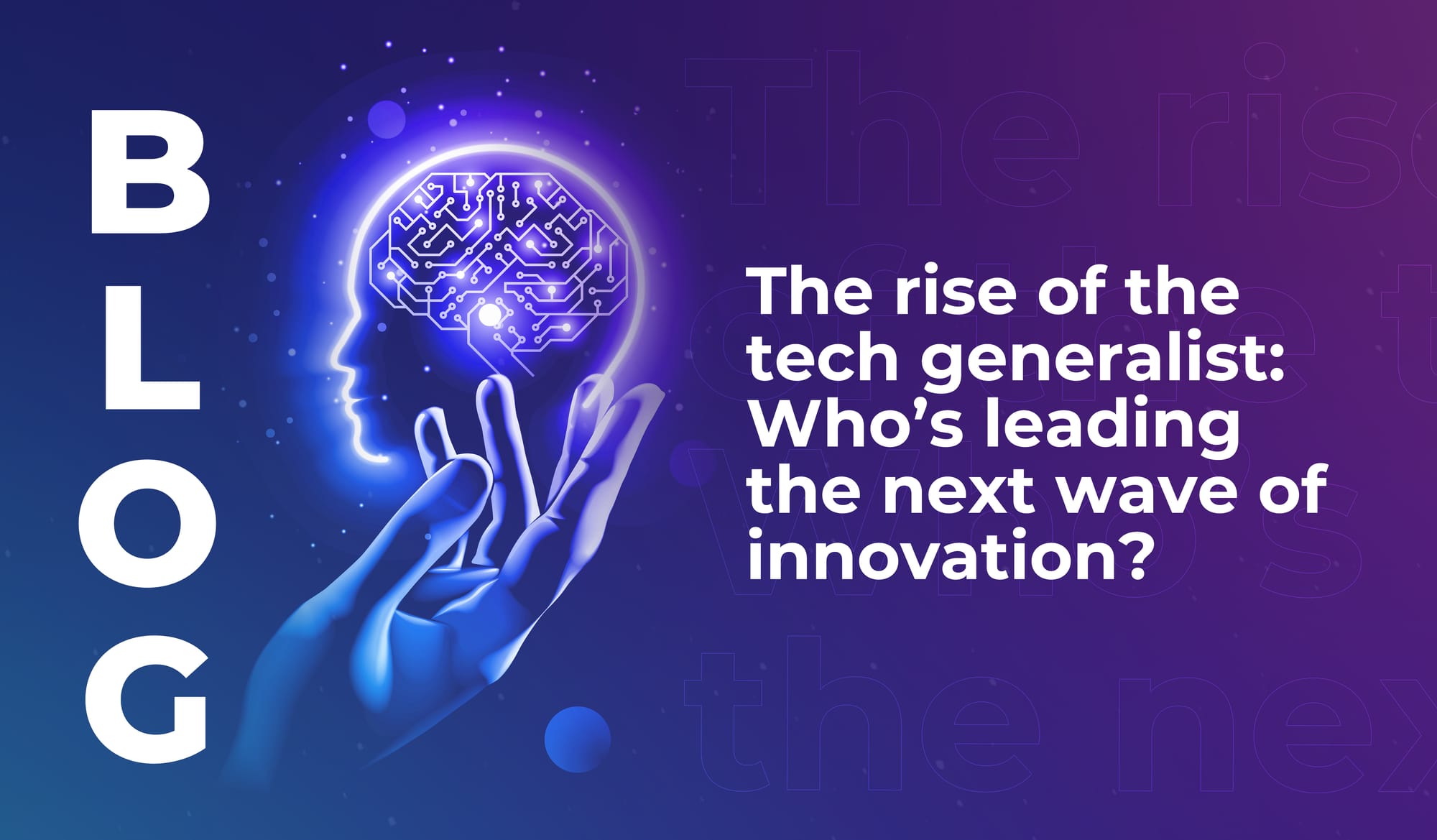
What does your working life look like in 2022, compared to 2019? Probably not quite the same. Research by human resources firm Gartner found that 75% of hybrid or remote workers expect flexible working arrangements to continue post-pandemic – and that if an organisation did go back to 100% on-site work, it would risk losing 39% of its workforce.
As a result of COVID-19 and the rapid digital transformation, everyone knows that hybrid working can facilitate productivity and team success. Add to that the acceleration of digital tech that enables teams to work together from all corners of the globe; and increasingly competent AI that will take on a bigger role in business (according to Signal AI, 96% of global business leaders believe AI will transform how decisions are made); and the future of work looks very different.
At #LEAP22, a group of pioneers in industrial tech got together to talk about exactly that. The discussion between Gonzalo Usandizaga (President of International at Micro Focus); BJ Jenkins (President at Palo Alto Networks); Christian Reilly (Global VP of Product Strategy and Innovation, CITRIX); and Mohammed Ashour (Founder and CEO at Aspire) was chaired by Jonathan Woetzel (Senior Partner, Director, Global Leader at McKinsey Global Institute, Cities Special Initiative) – and together they gave us a strong sense of what work might look like in the coming years, and what we shouldn’t be afraid of.
Are skills accelerating as fast as tech?
‘Acceleration’ is one of those words that has defined the last couple of years across all industries – but as Usandizaga pointed out, “it was unplanned, it was forced, it was brutal, it was fast,” and not all areas moved as quickly as others. Now, as we regroup and assess the impact of the shift to digital across many areas of employment, two key areas of concern are employee loyalty (how do we ensure people are happy in their jobs, and slow the turnover of staff?), and the lack of skilled workers needed to drive the fourth industrial revolution.
On the employee loyalty point, Usandizaga said wellbeing initiatives will be essential. “Employee wellbeing is becoming extremely important,” he noted, and businesses have to introduce wellbeing programs to support their teams’ mental and physical health, and make sure employees have the time they need to be involved in (and give back to) their local communities.
On the skills point, he suggested that education is key: tech companies in particular must build strong partnerships with universities, and promote graduate programs that will introduce talented people to future job roles for which there’s currently a lack of skilled workers available.
Speaking from a cybersecurity perspective, Jenkins echoed this sentiment. “Any company’s ability to deal with the thousands of attacks that happen is dependent today on a combination of technology and individuals,” he said. Which is why Palo Alto Networks is partnering with local universities in Saudi Arabia, and creating cyber academies to train a new generation of security experts. With the skilled human workforce already in development, he added, “we’ll marry that with machine learning and artificial intelligence,” to strengthen the region’s security provisions even more.
Startups must not be underestimated
There’s also an ongoing explosion in the emergence of new startups – facilitated, again, by digitisation and increasingly accessible tech. In the US alone, 5.4 million new startup applications were filed with the government in 2021, beating the 2020 record of 4.4 million. In Saudi Arabia, startups are already on track to overtake the 2021 record levels for VC funding – with investments reaching over $425 million by August 2022, according to data from PitchBook.
“That’s a profound change,” Ashour said, “because 50 years ago the cost and barriers to starting a company were very significant. Today, you can start a company in an afternoon with a couple hundred bucks.”
Ashour’s own story is a good illustration of this: “I’m a very unlikely entrepreneur,” he shared. “I was training to be a neurosurgeon, and when I was in medical school I came across a business competition called the Hult Prize.”
The Hult Prize is widely seen as the Nobel Prize for business – it invites young people to take a major global challenge and develop a business solution to solve it. In 2013, that challenge was food security; and it drove Ashour to identify the potential for insects to provide a sustainable, affordable source of protein for human beings.
That protein then became the basis for his business. But it also became the basis for a whole new industry. A startup like this doesn’t just create new direct jobs, but also new indirect jobs – for example, when insects come to be a part of human food products, that creates the need for specific regulation by national bodies (like the FDA and the USDA), so new jobs are created to deal with that. Insect agriculture is also creating new jobs in academia, as researchers embark on studies to consider the physiological and sustainability impact of insect farming (like this 2021 study on how edible insects are contributing to food security in Madagascar).
So startups can create new jobs far beyond the boundaries of the startup itself. For Ashour, this means there’s “a misplaced moral panic around the idea that there’s going to be this massive unemployment issue. It’s not going to be that we won’t have enough jobs. I think it’s that the gap between the jobs of the future and the skills that people have today is massive.”
But if we redirect that concern around not enough jobs, and point it instead at the issue of reskilling the workforce, the future will be bright.
Balancing expectations between business leaders and employees
At CITRIX, Reilly has been interested in the difference in perceptions of new tech and work changes between business leaders and employees. “As technologists we always want to look a little bit ahead,” he said, and doing research now could help to prepare the global population for major shifts in the future.
So CITRIX commissioned a piece of research called Work 2035. It was a big undertaking, involving 500 interviews with C-Suite leaders and 1,000 interviews with employees from medium and large companies, across a vast array of sectors from financial services to life sciences, and retail to technology.
“The idea,” Reilly said, “was to ask questions about the evolution of technology and the evolution of employees, and try to figure out what that might look like in 2035,” and how that evolution might create business value over the next decade-and-a-bit.
Of all respondents, 70% felt that by 2035, AI will be intrinsic to helping them make better business decisions. And almost every single respondent said that they believe new technology interfaces and environments will help them become more productive and effective in their work.
But something that stood out quite clearly was the difference in responses from those who were leading the businesses, and those who were working as employees. “We noticed that the business people have a far higher expectation of the impact of technology on overall output and productivity than the employees themselves,” Reilly said.
These findings are consistent with other, smaller studies – Forbes recently called it the ‘optimism divide’. Employees are a little worried, even a little scared, about how tech will influence the direction of their work in the future.
It’s an interesting balance to watch as we move through the coming years. Will employees catch up with the optimism of business leaders about tech and the future of work? Or will business leaders have to temper their enthusiasm and meet their employees in the middle, changing their expectations of how and where tech solutions will drive change? As of right now, it’s unclear how this will go. There’s no doubt that technology will continue to change the future of work – but in what ways, and with what impact, will be determined by the human beings involved.








